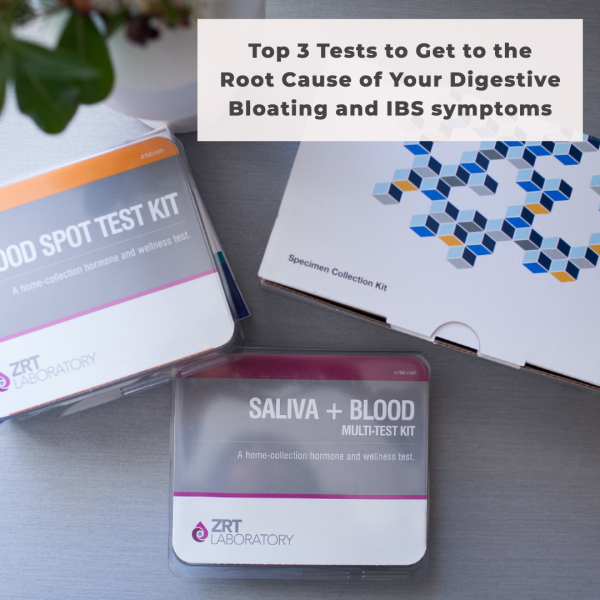Did you know that it is not normal to have consistent abdominal bloating? It is not normal to feel like you are 4 months pregnant after you eat! There can be a number of reasons as to why you are experiencing such discomfort, and as Naturopathic Doctors we like to address the root cause so you can get back to enjoying food and feeling good in your clothes again.
The great thing about digestion is that we don’t have to guess what is going on because there are tests to lead us in the exact direction as to why you are having bloating. Our top 3 tests to get answers to resolve your digestive bloat and other Irritable Bowel Syndrome (IBS) symptoms are:
1) . Methane and Hydrogen Breath Test to Assess for Small Intestinal Bacterial Overgrowth (SIBO)
This test is the simplest, noninvasive, and easily accessible diagnostic test for suspected SIBO (1, 2). Using lactulose breath testing, your breath sample is analyzed to see if there are gases being produced by an overgrowth of bacteria in the small intestine. Based on our experience, this is one of the top causes of abdominal bloating and IBS symptoms (see our post all about SIBO here).
2. Microbiology Stool Testing:
Stool testing can be helpful to assess if a microbiome imbalance in the large colon is the culprit of your digestive symptoms. The sample is examined for bacteria and yeast cultures, it looks at the balance of both helpful and unhelpful gut flora, as well as analyzes for any infectious pathogens.
Perhaps the most comprehensive gut health assessment test we have is the GI Map test. The GI Map test uses a technology that has high sensitivity and specificity (i.e., is a reliable test), and looks for the presence of bacteria (including H.Pylori), yeast, parasites and viruses. It also looks at intestinal health markers that can give information on general digestive function, and alert to any inflammation.
3. Elimination Diet or IgG Food Sensitivity Testing to Rule Out Food Sensitivities as a Cause for Irritable Bowel Symptoms, including Bloating.
The gold standard test for food sensitivities is a comprehensive elimination diet and as Naturopathic Doctors this is always our first choice; however, it can be challenging for some to commit to and complete, and in these cases, we may choose to run the test. When we do food sensitivity testing we are measuring if you have any IgG antibodies formed against specific foods. If you do have these antibodies and are eating these foods regularly (even foods we consider healthy), immune complexes form and may cause symptoms such as those experienced with IBS.
The idea that these complexes can cause symptoms has been controversial amongst allergists and in the research; however, despite the test not being perfect (and it should be interpreted by a Naturopathic Doctor), we do find in practice it can be a clinically effective tool. Often when we test and remove food sensitivities, bloating and bowel habits can improve. Such findings are beginning to be seen in research as well, with some small studies showing improvement in symptoms of IBS when IgG reactive foods were tested and removed from the diet (3). Remember, food sensitivities are NOT the same as true food allergies, which are IgE mediated (i.e., this is not what we are testing!)
At Roots to Branches Whole Health Clinic, we only suggest testing if we feel it is going to give us information that will directly affect or alter your treatment plan. Interested in getting to the bottom of your digestion concerns? As Naturopathic Doctors, this is an area we excel! Book your FREE meet & greet or your initial appointment with one of our Naturopathic Doctors here!
Want more natural health information and recipes of the month? Sign up for our monthly newsletter and receive your free e-book for “5 Tips for More Energy and Greater Health”
Five Tips for More Energy and Greater Health
References:
- Ghoshal, U.C., Shukla, R., & Ghoshal, U. Small intestinal bacterial overgrowth and irritable bowel syndrome: a gap between functional organic dichotomy. Gut Liver. 2017 Mar; 11(2): 196–208.
- Pietrzak, A., et al. Guidelines in the management of irritable bowel syndrome. Prz Gastroenterol. 2018; 13(4): 259–288.
- Mansueto, P, D’Alcamo, A., et al. Food allergy in irritable bowel syndrome: the case of non-celiac wheat sensitivity. World J Gastroenterol. 2015 Jun 21; 21(23): 7089–7109.

